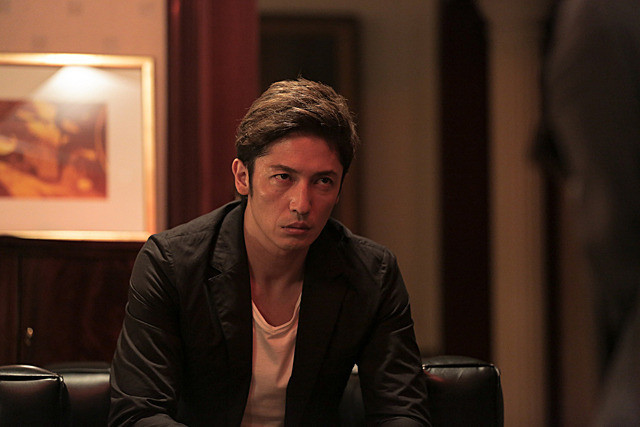Aku to Kamen no Ruru is a mess, but is carried by strong performances.
It's time for a blog post about a very messed up movie in a sense of the term. Well, I don't know if everyone would consider it messed up, but it did make me feel things. Based on the rather great novel by Fuminori Nakamura, the 2018 crime drama/thriller Aku to Kamen no Ruru is the focus of today's post.
Fumihiro Kuki is the son of Shozo Kuki, a very wealthy man belonging to a Zaibetsu. Shozo calls Fumihiro to his study where he explains that he will inherit the family tradition of becoming evil, something which Fumihiro is dismayed by. In order to draw out the evil within his son, Shozo does some despicable acts, such as raping his own adopted daughter, Kaori Kuki, the girl whom Fumihiro is in love with. One day, Fumihiro summons the courage to lock his father in a secret room and kills him in order to protect Kaori. Following this incident, he distances himself from Kaori due to him being reminded of his father whenever he sees her. Eventually, this leads to Kaori leaving the mansion in which they had lived together.
Fumihiro then disappeared. Or so everyone thought, as he actually underwent plastic surgery in order to change his face and dons a new identity. Using the persona of Koichi Shintani, he watches over Kaori and gets dragged into some situations in which he once again does what her has to in order to protect her.
The movie is interesting in unexpected ways. It does pose questions such as what is truly evil and can evil people be redeemed. It does fail at convincingly portraying the lead character, Fumihiro Kuki, as an evil man though. His every evil act, such as murdering his father or Miyajima, are both situations in which his thoughts are simply to protect Kaori from harm. Those he does harm aren't exactly good people themselves and so there's no real reason to be horrified by his actions at all. So, whilst the act of murder is evil, his intentions certainly aren't and he is not as evil as his father wanted him to become.
Speaking of his father, there is a hint in spoken dialogue that he regretted raising his family in such a dastardly way. In a conversation between Kukis' it is revealed that Shozo kept tabs on his kids and also had evidence of certain misdeeds. I won't spoil the character whose evil acts Shozo had been collecting evidence of, but it is quite sad that he actually had an inherent sadness, something which is passed down the family line.
I appreciate that it was trying to tell a story, but even I felt like it had left stuff on the cutting room floor that should have been included in the final cut. It felt like there was too much missing, things were resolved in a way that seemed quite rushed and everything needed a bit more time to breathe and expand. In my opinion, this would have been better suited for a drama as the story could have the time to breathe across multiple episodes and more details could have been included.
There is some beautiful cinematography in the movie. A wide array of dynamic shot types, camera angles and varying techniques helped bring the movie to life in a visual spectacle. There's some fast paced cuts used in combination with extreme close ups that emphasise character reactions and frantic musical scores that really do a great job at ramping up the tension in certain scenes. My favourite shots were the tracking shots that showcased Fumihiro walking to his destination through the lens of several reflective surfaces. It really was a cool way to frame what is otherwise a benign scene.
Other than the cinematography, the biggest saving grace of the movie is the performances from the extremely talented cast. Hiroshi Tamaki does a tremendous job in a tough role as Fumihiro Kuki. He expertly navigated through the almost dual role by perfectly expressing the menacing glare when he has to do some unscrupulous things in order to protect Kaori as well as showing a wide variety of emotions when the character opens up and lives. His final scene in the movie is a real tearjerker thanks to his and Yuko Araki's convincing heart pouring.
Tatsuya Nakamura was a joy to watch. Whenever he was on screen, it was impossible to look away due to his mesmerising performance. His introductory scene alone establishes him as a powerhouse and a fascinating character that you want to see more of.
Overall, I was disappointed by the messy plot and it was a real shame because the cast all put in tremendous performances and the cinematography feels too good for the movie. It might be worth it for the performances alone, especially Hiroshi Tamaki's and Tatsuya Nakamura's. Yuko Araki is also very nice to look at as is Miyuki Yokoyama. Plus, it does have some Oppai!






Comments
Post a Comment
Please be respectful. It's ok to disagree and debate topics, but in a polite manner.